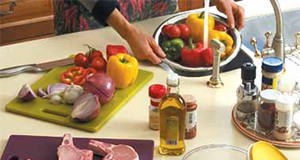
Phosphorous is an essential mineral necessary for the formation of bones and teeth, but also for kidney function and the regulation of muscle contractions, heartbeat, and nerve transmission. High blood levels of phosphorus may lead to adverse effects on bone, kidney, and heart health. When there is too much phosphorus in the blood, the body reacts by leaching calcium from the bones. This can be especially dangerous for those with Chronic Kidney Disease. This four-page fact sheet discusses the relationship between Chronic Kidney Disease and Phosphorous intake, examining foods that are high in phosphorous and ways to manage phosphorous levels. Written by Nancy J. Gal, Lauren Headrick, Kate Bennett, and Wendy J. Dahl, and published by the Food Science and Human Nutrition Department.
http://edis.ifas.ufl.edu/fs273
Tag: Kate Bennett
Raising Healthy Children: Age Four
 As children continue their preschool years, they learn many new things and develop their own opinions and ideas. During this time, people inside and outside of the home may greatly influence them. As preschoolers continue to learn and grow, caregivers can take many steps to guide their children in a healthy and positive direction. This 4-page fact sheet was written by Kate Bennet, Gail Kauwell, and Karla P. Shelnutt, and published by the UF Department of Family Youth and Community Sciences, April 2014.
As children continue their preschool years, they learn many new things and develop their own opinions and ideas. During this time, people inside and outside of the home may greatly influence them. As preschoolers continue to learn and grow, caregivers can take many steps to guide their children in a healthy and positive direction. This 4-page fact sheet was written by Kate Bennet, Gail Kauwell, and Karla P. Shelnutt, and published by the UF Department of Family Youth and Community Sciences, April 2014.
http://edis.ifas.ufl.edu/fy1398
Raising Healthy Children: Shellfish Allergies
 Learning that your child has a shellfish allergy can be scary. But having a plan and knowing how to treat and avoid a reaction to shellfish can ease this fear and keep your child safe. This publication explains shellfish allergies and provides information on the symptoms and how to respond if a reaction occurs. There are also tips to make it easier to manage your child’s shellfish allergy at home and away from home.This 4-page fact sheet was written by Kate Bennett, Karla P. Shelnutt, and Gail P. A. Kauwell, and published by the UF Department of Family Youth and Community Sciences, November 2013.
Learning that your child has a shellfish allergy can be scary. But having a plan and knowing how to treat and avoid a reaction to shellfish can ease this fear and keep your child safe. This publication explains shellfish allergies and provides information on the symptoms and how to respond if a reaction occurs. There are also tips to make it easier to manage your child’s shellfish allergy at home and away from home.This 4-page fact sheet was written by Kate Bennett, Karla P. Shelnutt, and Gail P. A. Kauwell, and published by the UF Department of Family Youth and Community Sciences, November 2013.
http://edis.ifas.ufl.edu/fy1402